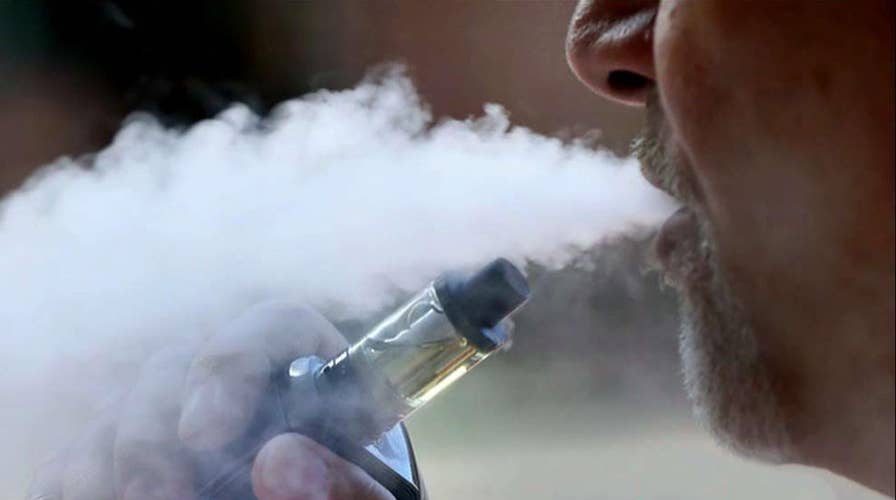State health departments report 18 vaping-related fatalities in 15 states
Centers for Disease Control and Prevention reports more than 800 people have gotten sick after vaping; Jonathan Serrie reports from Atlanta.
Surpassing 1,000 cases, the outbreak of U.S. vaping-related illnesses is starting to look like the early signs of an epidemic.
The Centers for Disease Control and Prevention said Thursday that 1,080 confirmed and probable cases have been reported in 48 states and one U.S. territory. The count includes 18 deaths in 15 states.
The median age of patients who have died is 50 years, ranging from 27 to 71 years.
The first illnesses occurred in late March. Recently, 200 or more cases have been reported each week. Only Alaska and New Hampshire have yet to report cases.
About 70 percent of patients are male. Approximately 80 percent of the patients are under 35 years old; 16 percent are under 18 years old. The median age of patients is 23 years, ranging from 13 to 75 years old.
“The increasing number of lung injury cases we see associated with e-cigarette use, or vaping, is deeply concerning. Unfortunately, this may be the tip of the iceberg when it comes to the escalating health threat this outbreak poses to the American public, particularly youth and young adults. CDC will continue to work with FDA and state health partners to investigate the cause, or causes, of this outbreak and to bring an end to these lung injuries,” said Dr. Robert R. Redfield, director of the Centers for Disease Control and Prevention, in a statement.
Doctors said the illnesses resemble an inhalation injury. Symptoms include severe shortness of breath, fatigue and chest pain.
So far, officials have not identified a particular electronic cigarette, vaping device, liquid or ingredient behind the outbreak. But most who got sick said they vaped products containing THC, the ingredient that gives marijuana its high.

In this Dec. 20, 2018, file photo Juul products are displayed at a smoke shop in New York. (AP Photo/Seth Wenig)
Federal consumer watchdogs, meanwhile, have ordered Juul and five other vaping companies to hand over information about how they market e-cigarettes, the government’s latest move targeting the industry.
The announcement Thursday from the Federal Trade Commission comes amid the nationwide crackdown on e-cigarettes as politicians and health authorities try to reverse an explosion of underage vaping by U.S. teenagers.
The FTC said in a statement it wants to “better understand” vaping sales and promotional practices, including e-cigarette giveaways, online influencer programs and marketing on college campuses. Those techniques are also at the center of several state and federal investigations into whether Juul’s early viral marketing efforts helped spark the surge in teen vaping.
Last week San Francisco-based Juul announced it would cease all advertising of its small, discrete vaping devices. A company spokesman said Thursday in a statement: “We will fully cooperate and are focused on earning the trust of regulators, policymakers and other stakeholders.”
Federal law prohibits traditional tobacco companies from numerous sales tactics, including giving away cigarettes, sponsoring sports events and advertising on television, radio, public transportation and billboards. But those laws don’t apply to e-cigarettes, which first launched in the U.S. in 2007.
More than 1 in 4 high school students report vaping in the past month, according to the latest government survey data. Top health officials have called the trend an epidemic that risks addicting a generation of young people to nicotine.
Besides Juul, the government is also seeking information from R.J. Reynolds Vapor Company, Fontem US, Logic Technology Development, Nu Mark and NJOY. Regulators want to review company materials beginning in 2015.
Besieged by criticism, Juul announced a series of surprise concessions last week: halting all advertising, pledging not to lobby against a planned federal ban on vaping flavors and replacing its CEO. Juul already faces multiple investigations from Congress, the Food and Drug Administration and several state attorneys general.
CLICK HERE FOR THE ALL-NEW FOXBUSINESS.COM
The privately-held company controls nearly 70 percent of the U.S. retail market for e-cigarettes and became a cultural phenomenon on the success of its high-nicotine, flavored pods.
Most experts agree that e-cigarette vapor is less harmful than cigarette smoke because it doesn’t contain most of the cancer-causing chemicals in burning tobacco.
The Associated Press contributed to this report.










































